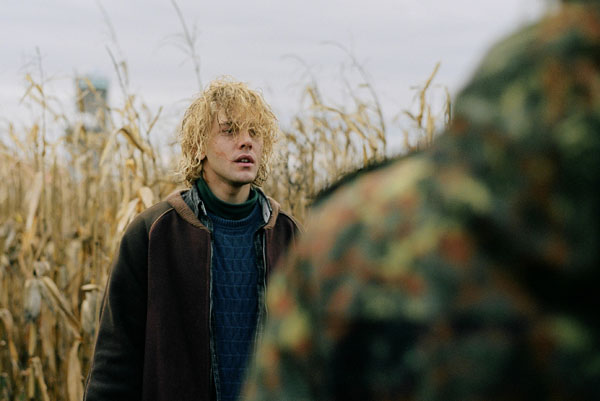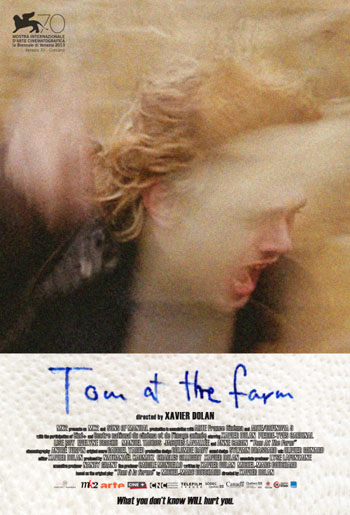We begin with David Jenkins at Little White Lies: “The fourth film by ultra-precocious Quebecois multi-hyphenate Xavier Dolan is, by a country mile, his strongest to date, louchely jettisoning the rah-rah pretensions and blustering style flourishes of yore in favor of a taut, precise psychodrama that wears its influences lightly but firmly. During his poseur phase, Dolan employed the camera as a machine to artificially beautify his subjects (and himself). And why not? He was 19 years old for Christ sake! Yet in Tom at the Farm, he thankfully heads in the exact opposite direction, to such a degree that the film as a whole comes across as a wry exercise in self-aware reinvention.”
“Dolan overreached with last year’s Laurence Anyways, a three-hour transgender saga that overindulged his admittedly striking stylistic affectations,” grants Guy Lodge in Variety. But Tom at the Farm “is a trimmer, tarter effort all round. Perhaps not coincidentally, it’s also his first collaboration with another writer. A kinky queer noir detailing the dangers awaiting a gay Montreal hipster (Dolan) as he journeys to the homophobic heartland for his lover’s funeral, it’s an improbably exciting match of knife-edge storytelling and a florid vintage aesthetic best represented by Gabriel Yared’s glorious orchestral score. Dolan’s most accomplished and enjoyable work to date, it’s also his most commercially viable.”
“Cine-Vue was also very positive,” notes Brendan Kelly in the Montreal Gazette. And “Libération was also full of praise for Dolan’s fourth film, calling it one of the most notable films at the festival. But the Hollywood Reporter’s David Rooney… lashed into the film and Dolan. He basically suggests Dolan appears to be obsessed with himself. Writes Rooney: ‘Dolan is an accomplished enough actor to withstand the attention, but he inadvertently makes this sinister quasi-thriller—which is as much about gay self-loathing as homophobia—also about auteurial self-adulation.'” There’s more, of course, but the gist of Kelly’s piece is that “Xavier Dolan, being Xavier Dolan, didn’t take these hits sitting down. Shortly after the review was published he tweeted the Hollywood Reporter to let them know what he thought of Rooney’s critique. He tweeted: ‘You can kiss my narcissistic ass.'”
At any rate, Dolan is the Tom in Tom at the Farm (Tom à la ferme), adapted from the play by Michel Marc Bouchard, in which Tom heads out to that funeral. His lover’s mother, Agathe (Lise Roy), had no idea her son was gay, but her older son, Frances (Pierre-Yves Cardinal) did and is not pleased to see Tom arrive. “More than anything else,” writes Oliver Lyttelton at the Playlist, “Tom à la ferme is reminiscent of the work of Strangers on a Train and The Talented Mr. Ripley author Patricia Highsmith. The sexuality might be a little less subtextual (though there’s nothing explicit here), but the testy, shifting power plays in the relationship between Tom and Frances, which serves as the heart of the film, bring to mind a contemporary update of Highsmith’s work, albeit seen through Dolan’s lens, making it of a piece with his earlier films, particularly once Sarah (Evelyne Brochu), the co-worker posing as the late Guillaume’s girlfriend, arrives on the scene to complicate things further.”
At Cineuropa, Domenico La Porta suggests that “Tom at the Farm resembles Stranger by the Lake by Alain Guiraudie…. Tom at the Farm is probably more ‘serious’ and ‘conventional,’ but it is just as ambitious.”
More in German from Frédéric Jaeger (Die Presse) and Cristina Nord (die taz).
Competing in Venice, Tom at the Farm will be a Special Presentation in Toronto.
Update: One “quirk that eventually tips over into self-indulgence is the way Dolan uses Gabriel Yared’s big, solemn orchestral soundtrack,” finds Screen‘s Lee Marshall. “It’s intriguing trick at first, giving the film a much darker tone than the script alone could manage, and squeezing some of the mannerism out of the dialogue. But it’s kept so high in the mix that it soon becomes wearing—just like the Frida Boccara French-language version of ‘Windmills of My Mind’ that accompanies Tom’s arrival at the farm—ravishing at first, but held for one verse too long.” And “for all the plot tension and genre tastiness—underlined by some acidic color photography and lighting that plays up sickly yellows and purples—there’s just something a little too mannered about the exercise.”
Updates, 9/7: “For a while, it’s like a Pasolini picture gone potty,” writes Nigel Andrews in the Financial Times. “For a later while, it’s like a Hitchcock movie where everything is in place except the point and the destination. You have to love the visuals, though: slow-burn tableaux of voluptuous menace.”
Writing for Indiewire, Shane Danielsen disagrees. He notes that once Tom goes out to that farm, “he comes under the spell of Francis, his ex’s older brother—a barely-civilized thug given to walking around bare-chested, pinning Tom to walls, asphyxiating him, dancing the tango with him, spitting in his mouth… you know, the usual stuff guys do…. [A]nd while there’s undeniably something interesting in the tale of a young hipster’s capitulation to a backwoods Angry Top, it’s undone by the lack of even rudimentary psychology, and by the filmmaker’s shaky command of tone.”
Updates, 9/8: David Ehrlich at Film.com: “Rife with the psychosexual tension of a Claude Chabrol potboiler and touched by the stranded unease of Li Yang’s Blind Mountain, Dolan’s thriller is a slippery little thing, so unstable that it occasionally even switches aspect ratios when Tom and Francis are tussling, as though the two men only achieve a clear sense of purpose while physically pursuing one another. Dolan is clearly smitten with the idea of putting his own twist on the genre, and the greatest takeaway from this staunchly opaque effort might be that the emerging director can put your heart in your throat as capably as he can tear it out of your chest.”
For Adam Nayman, writing for Cinema Scope, “all the pounding musical cues in the world can’t drown out the banality of the subtext here, which is that cute cosmopolitan kids—including also the very fine Eve Brochu as Tom’s lone distaff pal—are better off avoiding off-road backwaters lest they become initiated into barely repressed incestuous dysfunction. If the final shots of Francis bellowing helplessly as another little brother figure flees for higher ground recall the end of The Texas Chainsaw Massacre, it’s less a compliment to Dolan’s cinephilia than a comment on the barn-side broadness of Tom at the Farm’s rural-urban dichotomy.”
Update, 9/9: “Mingling melodrama, rural horror and absurdist plotting (Tom’s inability to escape evokes Buñuel’s Exterminating Angel as much as Carpenter’s Into the Mouth of Madness), Dolan takes turns satisfying and stymying the conventions of the genre,” writes John Semley for Now Toronto. “Though the film’s theme of rural life’s allure to a city kid like Tom feels a bit too clearly flagged (often by literal signage, like the poster above Guy’s bed reading ‘FEEL REAL’), Tom At The Farm stands as one of the more intriguing horror films in years.”
Update, 9/11: “If we only we had been led to care for Tom or his broken antagonists, then maybe the film could have been much more emotionally resonant,” writes Nicholas Bell at Ioncinema.
Update, 9/14: Tom is Dolan’s “first real folly,” argues A.A. Dowd at the AV Club. “The tone veers violently from scene to scene, variously suggesting a fish-out-of-water comedy, a psychodrama, and a Misery-style thriller—none convincing.”
Update, 9/17: “Tom at the Farm owes a good deal of its percolating tension and slippery tone to Hitchcock,” writes Nick McCarthy at the House Next Door, “and yet it also indicates a rather mature progression for a filmmaker whose influences often cannibalize his content (see Heartbeats). This startling thriller still possesses the mark of Dolan’s impish impulses, resisting humanization and never allowing the audience to fully understand a character’s motivations—yet, due to the plethora of close-ups, interior clues often come into focus.”
Update, 9/19: “Beyond the psychological-drama aspects,” writes Kenji Fujishima at In Review Online, “Tom at the Farm plays as an excoriating takedown of the lie of family ties as a source of strength; here, the sense of togetherness is simply a fragile mask of deeper, more destructive neuroses.”
2013 Indexes: Venice and Toronto. For news and tips throughout the day every day, follow @KeyframeDaily on Twitter and/or the RSS feed. Get Keyframe Daily in your inbox by signing in at fandor.com/daily.





